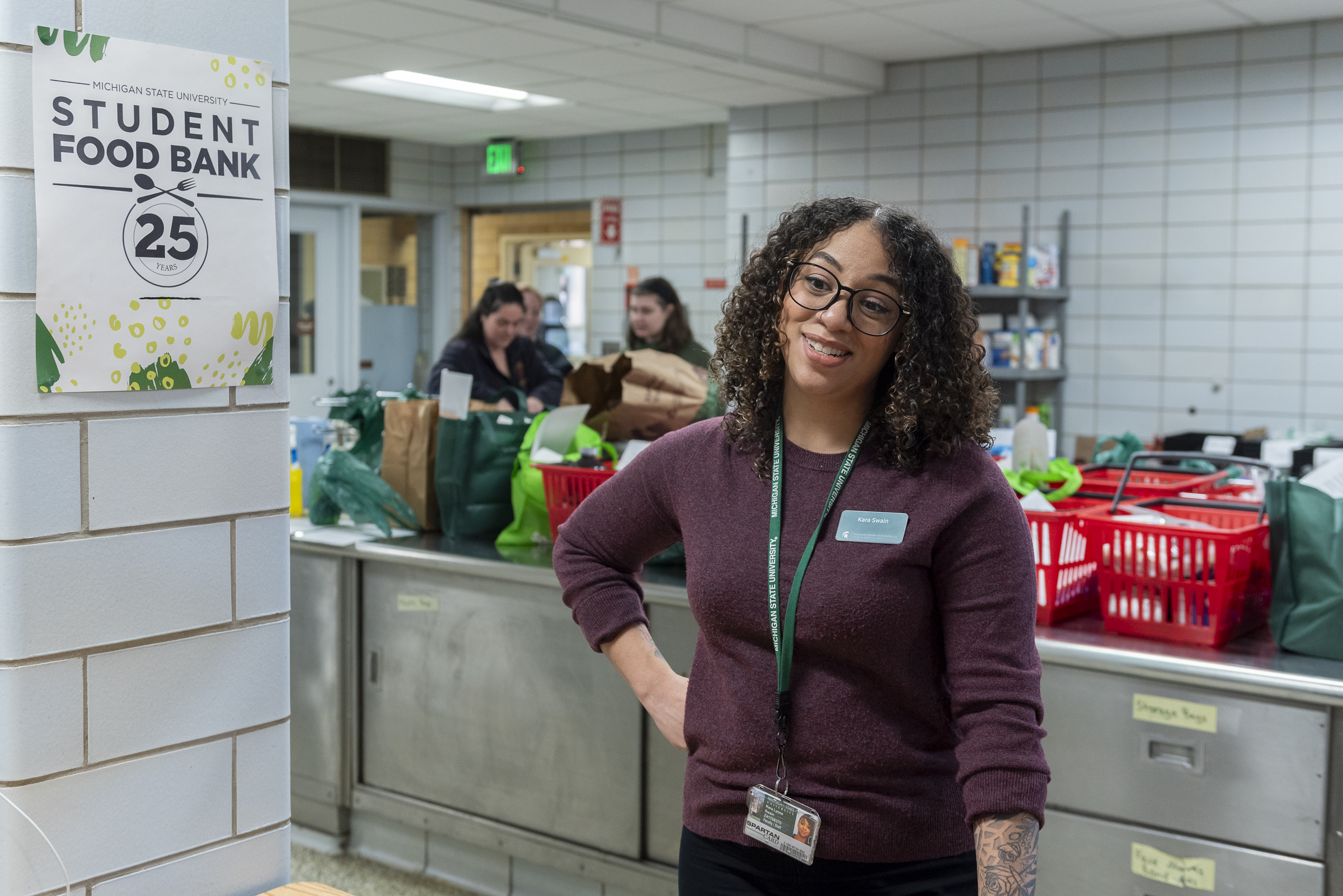As the MSU Student Food Bank coordinator, Kara Swain brings a deeper understanding to her role, using her background in sociology, and as a graduate of MSU's Department of Sociology, to address food insecurity and advocate for meaningful change. Through partnerships, student support, and a commitment to dignity, she works to ensure that no Spartan goes hungry.
In this season of celebrations and festivities, often centered around food, I see the greatest need at the MSU Student Food Bank.
I began my role as coordinator of the MSU Student Food Bank in August, and in just a few short months, I have witnessed firsthand how the demand for food assistance ebbs and flows. As I work with students, I see them navigating changes in the economy, balancing multiple jobs with their classes, and struggling to secure enough food for themselves and their families.
Having access to food is more than just nourishment—it helps people live with dignity. As I walk through our storage rooms, I am reminded every day of how essential this resource is for our community.
The MSU Student Food Bank, housed in Olin Health Center, serves between 500 and 600 people each year with the support of 25 dedicated student workers and volunteers. I am the only full-time employee.
What started in 1993 as a student-led initiative—the first of its kind in the nation—has grown into a vital resource for students and their families. Now operating under University Health and Wellness, we work closely with the Greater Lansing Food Bank to purchase food at a lower cost, ensuring we can provide as much as possible to those in need.
Over the course of a year, we serve more than 6,000 students and distribute over 110,000 pounds of food. Our shelves are stocked not only with staple items like canned vegetables and boxed macaroni and cheese but also with fresh produce, milk, soup, and other nutritious options. Thanks to generous donations, we even have a large freezer filled with meat, fish, chicken, and, on special occasions, unexpected treats—like the recent surprise delivery of Starbucks breakfast sandwiches.
Beyond food, we recognize the importance of basic household and hygiene products. That’s why we also collect and distribute diapers, menstrual products, dish and laundry soap, and toilet paper—necessities that are often overlooked but essential to daily life.
Each day, I see our student workers and volunteers sorting boxes, packing bags, and ensuring that every order is filled with care. It is a fast-paced and rewarding environment, and I am constantly inspired by their dedication.
My passion for this work is deeply rooted in my background. I discovered my love for sociology when I transferred to MSU from Lansing Community College in 2014. I still remember the moment in my first sociology class when everything clicked. As we discussed race, ethnicity, gender, and class, I realized I had found my path. It was an "aha" moment—this was the field where my values and interests aligned.
Studying sociology at MSU helped me understand the systemic roots of issues like hunger and the importance of creating partnerships to address them. One of the most formative experiences of my academic career was working with Sociology Professor Emeritus Carl Taylor. Those foundational lessons continue to shape the way I approach my work every day.
My degree has not only informed my professional life but has also reframed my worldview. It has given me the tools to see hunger as more than just an isolated issue—it is a symptom of much larger systemic problems. That perspective allows me to bring a deeper understanding to my role and to advocate for meaningful change.
The MSU Student Food Bank operates year-round, providing students and their families with essential food items. Participants submit online requests for the foods and supplies they need, selecting a pick-up time that works for them. Each morning, my team and I begin filling these orders, carefully packing dry goods and shelf-stable items into boxes.
It often feels like a treasure hunt, as we navigate the shelves stocked with everything from Ghirardelli chocolates to dried beans and rice. When participants arrive, we check them in and gather their perishable items at the last moment to ensure freshness. For those who don’t have a pre-submitted request, we offer pre-made “emergency to-go bags” or provide the option to fill out a form on-site.
Every day, I am reminded of the impact this work has on the lives of MSU students. Whether it’s helping someone through a difficult time or providing them with a moment of relief, I know that what we do here matters. The food bank is more than a place to get groceries—it’s a place of support, dignity, and community.
This story has been modified from the original posting that ran on the Department of Sociology website.

